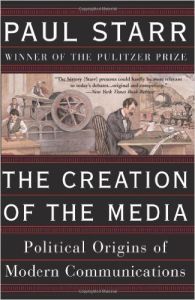
The Creation of the Media
Political Origins of Modern Communications
Recommendation
International in scope, immensely detailed and authoritative, this study successfully incorporates the evolution of technology, laws, political policy and social development to put the origins of modern media into context. This historical perspective is long overdue. Since media development is actually the story of societal development, author Paul Starr does a tremendous job of detailing the roles of such diverse factors as innovation, invention, patronage, luck, law and competition, all of which shaped the media’s development and helped determine its ultimate societal impact. This book is refreshingly light on political criticism, so each set of facts stands on its own. While Starr occasionally meanders from the main topic, the book’s rich detail shows that he clearly enjoyed his research and writing. getAbstract considers his book essential reading for anyone interested in new and old media and how they were – and are – influenced by their societies.
Summary
About the Author
Paul Starr is a professor of sociology at Princeton University and co-editor of The American Prospect. His book The Social Transformation of American Medicine won the 1984 Pulitzer Prize for nonfiction and the Bancroft Prize in American History.

















Comment on this summary